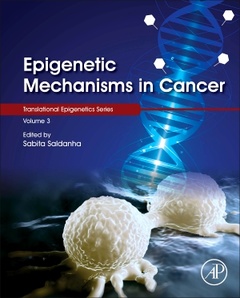Description
Epigenetic Mechanisms in Cancer
Translational Epigenetics Series
Coordinator: Saldanha Sabita
Language: English
Keywords
Aging; Androgen receptor; Biological markers; Biomarker; Biomarkers; Breast cancer; Cancer epidemiology; Cancer therapy; Cancer; Chemo-radio-resistant; Chromatin; Clinical trials; Colorectal cancer; Diagnostic biomarkers; DNA methylation; Drug resistance; Environment; Epidemiology; Epigenetic biomarkers; Epigenetic clock; Epigenetic modulations; Epigenetic; Epigenetics; Epigenome; Epimutation; Ethnicity; Etiology; Gene expression; Genetic; Germ cell; HDAC; Health disparity; Histone modification; Histone modifications; Hormone receptor; Leukemogenesis; Methylation; MicroRNA; MicroRNAs; miRNA; miRNAs; ncRNA; Next-generation sequencing; Ovarian cancer; Pancreatic cancer; Pediatric leukemia; Predictive biomarker; Prognostic biomarkers; Prostate cancer; Race; Targeted therapies; Testicular cancer; Transcription factors; Transgenerational inheritance; Treatment response; Tumor suppressor genes
Support: Print on demand
Description
/li>Contents
/li>Readership
/li>Biography
/li>Comment
/li>
1. Epigenetic Regulation in Pediatric Leukemia 2. Role of Epigenetics in testicular cancer 3. Changes in the epigenetic landscape of prostate cancer 4. Epigenetic health disparities and colon cancer 5. Genetic and epigenetic modifications in pancreatic cancer 6. Epigenetics of Breast Cancer 7. Epigenetic Modulations in Ovarian Cancer 8. Epigenetic Epidemiology for Cancer Risk 9. Epigenetic biomarkers in cancer epidemiology 10. Epigenetic biomarkers and racial differences in cancer 11. Epigenetic predictive biomarkers 12. Epigenetic signatures in the diagnosis and prognosis of cancer 13. Future Challenges and Prospects for the role of epigenetic mechanism in cancer management
researchers, early clinicians and advanced students investigating cancer at the genetic level
- Offers broad coverage that is applicable to audiences in various area of cancer research - population studies, diagnostics, prognosis, prediction, therapy, risk, etc.
- Provides critical review analysis of the topics that will clarify and delineate the potential roles of epigenetic signatures in cancer management
- Covers basic, as well as, clinical areas of epigenetic mechanisms in tumorigenesis
- Features contributions by leading experts in the field
- Provides comprehensive coverage of current epigenetic signatures involved in the etiology of various cancers and miRNAs




